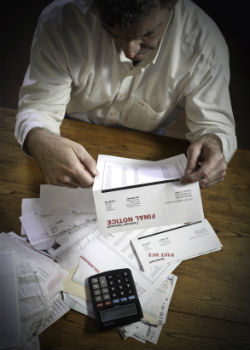Debts That May Not Be Discharged
Debt Relief Lawyer in Santa Rosa, California, Helping Clients Throughout Sonoma County For Over 30 Years
The discharge order issued in bankruptcy cases states that all dischargeable debts have been discharged. It doesn’t say which debts are and aren’t discharged. The Bankruptcy Code says all debts are discharged unless there is a specific exception that applies. Some of the exceptions (for example, fraud) require that the creditor file appropriate documents in the bankruptcy court within a certain number of days after the filing of the bankruptcy. If that deadline is missed, the exception is waived and the debt is discharged.
To learn more about your specific debts, schedule a FREE initial consultation with our Santa Rosa Debt Relief Attorney Thomas Jeffrey. Our bankruptcy law firm helps residetns throughout Sonoma County. Call now (707) 543-8530 or fill out our online form.
Tax Debt Relief
Despite what you may hear or read, tax debts can be discharged in bankruptcy in some circumstances. The rules on discharge of taxes can be very complicated and sometimes are different depending on what chapter of bankruptcy has been filed. In some cases, the taxes may not be dischargeable but the penalties are if paid in chapter 13. Interest on taxes paid in chapter 13 bankruptcy also normally stops once the chapter 13 case is filed. Since the IRS and the State of California continue to assess interest and penalties with payment plans outside bankruptcy, this can be a big benefit and sometimes is the only way to pay off taxes.
There also can be a difference between discharge of your personal liability and elimination of a tax lien. Attorney Thomas Jeffrey has consulted with clients many times about taxes and tax liens who were told by others (including other bankruptcy attorneys) that their taxes could not be discharged in bankruptcy when in fact they could. If you do searches or ask others about taxes in bankruptcy you may get a lot of bad information. The only way to get a good opinion in your case is to talk to a Sonoma County bankruptcy lawyer who is experienced with taxes.
Student Loan Discharge and Debt Relief
Although most people think student loans can never be discharged, there is a “hardship discharge". There are several requirements for this discharge, but the main one is that there must be proof that you can’t meet basic living expenses if you had to repay the loan and that this is unlikely to change in the future. It can be difficult to qualify for this hardship discharge and its requirements are based on case law which can change over time. If you may qualify for the discharge but the creditor does not agree on that issue, the only way to get the debt discharged is to file an “adversary proceeding” in the bankruptcy court. That is separate from the main bankruptcy case and the legal fees can be high. Debt Relief Lawyer Thomas Jeffrey tries to find an approach that is affordable for his clients when seeking discharge of student loans.
If your student loan can't be discharged, there are some repayment plans and loan forgiveness options offered by the federal government. Here is a link to the Federal Student Aid website describing some of these options. These can change over time and the Federal Student Aid website may not be updated immediately. Mr. Jeffrey recommends checking with several sources to make sure you know about all available options.
Fraud Debts
This is probably the most common form of debt that creditors try to claim as not dischargeable in bankruptcy. There are different types of fraud, but typically it involves a claim that the person filing bankruptcy intentionally defrauded a creditor.
Domestic Support Obligations
Domestic Support Obligations Child or Spousal Support ordered by a court is not dischargeable. Property Settlement ordered by the family court generally isn’t dischargeable in chapter 7 but may be in chapter 13. (If the bankruptcy is filed before the family court order, the obligation may be dischargeable even in chapter 7 bankruptcy.) However, family courts sometimes call a support debt property settlement and vice versa. The bankruptcy judge can look past the title to see whether the debt really was for support or property settlement.
Other Exceptions to Discharge
There are many other exceptions to discharge, including restitution ordered in a criminal case, some government fines, injuries from willful misconduct, and injuries from driving under the influence. Some of the exceptions are highly specialized and rare. The only way to know if any of these may be an issue for you is to consult with an experienced Northern California bankruptcy attorney.
FREE Consultation With an Experienced Credit Discharge Lawyer in Petaluma | Santa Rosa
If you would like to learn more about discharging credit debt, contact the Law Office of Thomas Jeffrey to schedule a FREE consultation at (707) 543-8530 or fill out our online form. Our experienced bankruptcy lawyer represents clients in Petaluma, Santa Rosa, and all surrounding communities throughout Sonoma County, in Northern California.
For more information, read our FAQ page and subscribe to our blog.


